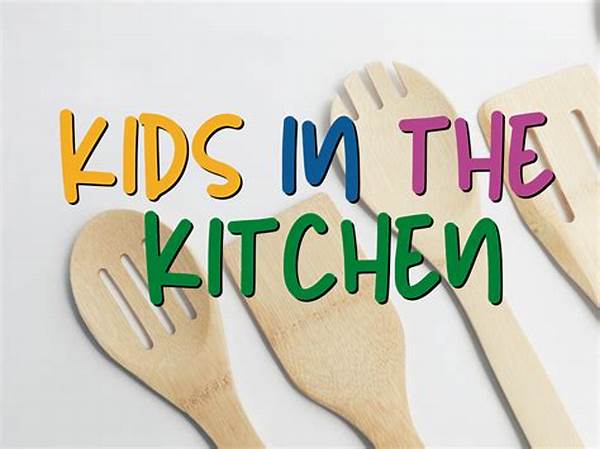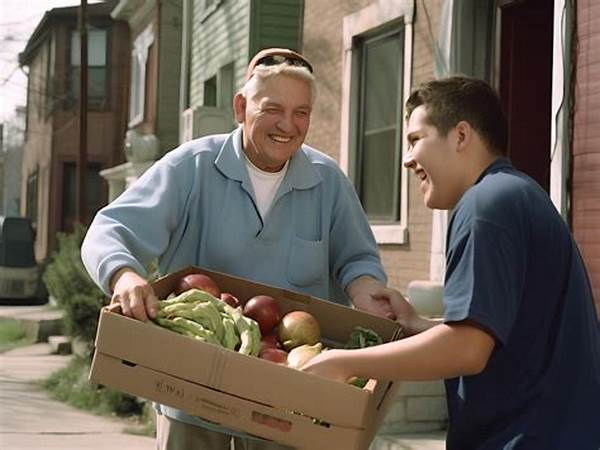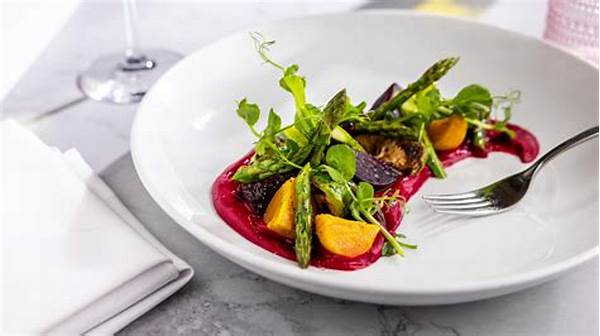Cooking is not just a life skill, but a gateway to creativity and learning for children. Engaging kitchen workshops for children can transform the kitchen into a playground of flavors, colors, and textures. These workshops not only amuse but also educate, enabling kids to grasp essential concepts while having fun. They serve as fantastic avenues to teach children about nutrition, teamwork, and responsibility, making everyday tasks delightful and educational.
Read Now : Ethical Sourcing Of Local Produce
The Magic of Kitchen Workshops
Engaging kitchen workshops for children are like a magic show but with spatulas and whisks. Let’s dive into the land of spatulas where fun meets fundamental skills. Kids gather around in eager anticipation, ready to roll out dough or whisk some batter. These workshops are interactive, hands-on, and social, allowing children to learn by doing—perfect for those little munchkins who get bored easily. Here, the process of making a sandwich or a simple salad becomes a cherished memory.
With smiles plastered on their faces, children learn the art of following instructions, measuring ingredients, and understanding flavors. These workshops are the perfect breeding ground for little culinary geniuses. Who needs abstract theories when you can learn in such a dynamic setting? Engaging kitchen workshops children in such a setting makes the task of learning as easy as pie—literally. Kids leave not just with tummy satisfaction but also with the knowledge they can use for a lifetime.
Benefits of Hands-On Cooking
1. Creativity Unleashed: Engaging kitchen workshops have the magic to bring out kids’ creative sides. They let imaginations run wild by mixing flavors, colors, and textures together. Why settle for ordinary peanut butter when you can have a funky, creative twist?
2. Confidence Booster: These workshops turn doubt into “I-can-do-it!” vibes. Cooking projects give kids a sense of accomplishment which is pure gold. Seeing a dish come together boosts not just culinary skills but self-esteem too.
3. Teamwork & Communication: Engaging kitchen workshops children learn to work in groups, sharing their ideas and listening to others. It’s where team spirit is built over a bowl of cookie dough, and problems are solved like a jigsaw puzzle.
4. Math & Science Fun: Learning measurements and understanding reactions like yeast rising is hands-on science. It’s math class but fun-sized and delicious. And yes, fractions make more sense when cookies are involved.
5. Healthy Eating Habits: These workshops pave the way for nourishing habits. Kids get to know what goes into their meals, promoting mindful eating right from the mixer bowl.
Exploring Through Food
Engagement through engaging kitchen workshops encourages children to discover new cuisines and cultures, offering a taste of the world. Imagine, a simple pasta-making class turning into a fiesta of Italian culture, or an attempt at sushi rolling that introduces Japanese etiquette. Such diverse lessons broaden their palates and knowledge.
Engaging kitchen workshops children are not confined to one culture. They tactfully break the boundaries of monotonous meals, introducing flavors from different corners of the world. These workshops aren’t just cooking classes; they’re journeys of culture, history, and social understanding. They unearth stories behind every dish, connecting tradition with taste.
The Community Connection
1. Cultivating Social Skills: It’s not just about the food; kids learn to communicate and collaborate, propelling social skills forward. Engaging kitchen workshops children get the social ball rolling in a light-hearted environment.
2. Bridging Generations: Kids bond with elder mentors who pass on their love for cooking. It strengthens family ties and builds a bridge over the generation gap. How’s that for a spoonful of nostalgia?
3. Environmental Awareness: Using fresh, local ingredients teaches them about sustainability and environmental consciousness. Cooking green prompts green living habits too. It’s all about loving our planet, one dish at a time.
Read Now : Prestigious Dining Locations Singapore
4. Cultivation of Patience: Waiting for that bread to rise tests patience and builds endurance. They begin to understand that things take time to perfect, much like life itself.
5. Food Appreciation: Engaging kitchen workshops children develop gratitude for the effort behind each meal, appreciating food’s journey from farm to fork. Respect for food becomes second nature.
6. Sorting Out Preferences: Children have the chance to explore likes and dislikes, forming dietary preferences and advocating for themselves in meals. It’s their chance to be the stars of their culinary show.
7. Mind & Body Coordination: It’s a melange of senses at play—smell the basil, sprinkle the salt. Engaging kitchen workshops children engage all their senses and sharpen motor skills simultaneously.
8. Encourages Curiosity: Curiosities are piqued when kids get the chance to deconstruct meals or ask, “What’s behind that yummy smell?” They become sound explorers in the culinary realm.
9. Bonding Over Food: Cooking and eating together offers families a chance to bond, to talk, to laugh, and create memories. The kitchen becomes a nucleus of familial warmth.
10. Future Chefs in the Making: With engaging kitchen workshops, children may discover a lifelong passion for culinary arts. Who knows, maybe you’ve got the next big chef in your home already!
Building Confidence One Dish at a Time
Engaging kitchen workshops for children provide an excellent platform to build confidence in kids. Every time they successfully flip a pancake or mix the perfect sauce, they’re reminded that they can achieve whatever they set their minds to. This little boost in the kitchen transcends its walls and seeps into other aspects of their lives. It’s like adding a touch of magic with broccoli—if they can do that, what can’t they do?
Through these workshops, children embrace mistakes and learn resilience. Drop the eggs? Mess up the cake? No problem! They understand that failure is part of the learning journey and grow comfortable navigating through it. Engaging kitchen workshops children teach that it’s not just about the final dish but about how they bounced back and learned through the process.
Conclusion: A Recipe for Creativity and Learning
In summary, engaging kitchen workshops for children are more than just mixing bowls and ingredients. They are life lessons wrapped in an apron, emphasizing creativity, teamwork, resilience, and cultural appreciation. These workshops provide a fertile ground for the imagination to flourish while nourishing bodies and minds alike. When children step into these culinary spaces, they’re not merely learning to cook; they’re unearthing bundles of joy and knowledge that will serve them for years to come—in the kitchen and beyond.



